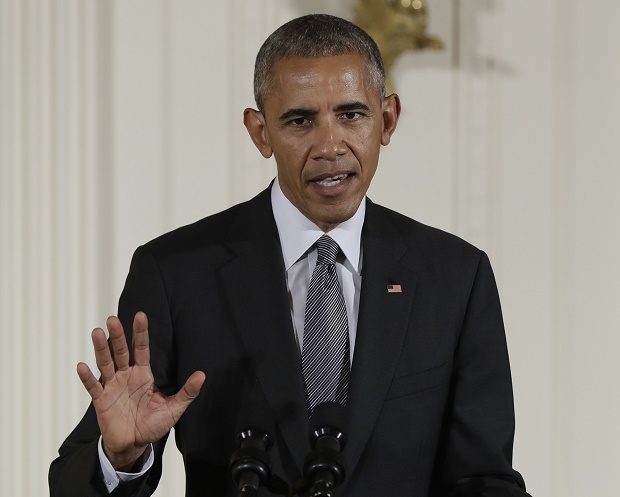Obama vetoes bill allowing 9/11 victims to sue Saudi Arabia

In this photo taken Sept. 22, 2016, President Barack Obama speaks in the East Room of the White House in Washington. President Barack Obama has vetoed a bill that would have allowed the families of 9/11 victims to sue the government of Saudi Arabia. The move sets Obama up for a possible first veto override by Congress. Both chambers passed the bill by voice vote. The House sent Obama the bill just before the 15th anniversary of the attacks that killed nearly 3,000 people in New York, Washington and Pennsylvania on Sept. 11, 2001. AP
WASHINGTON, United States – President Barack Obama on Friday vetoed a bill allowing 9/11 families to sue Saudi Arabia, risking a fierce public backlash and rare congressional rebuke.
While expressing “deep sympathy” for the families of the victims, Obama said the law would be “detrimental to US national interests.”
The White House tried and failed to have the legislation — which was unanimously passed by Congress — scrapped or substantially revised.
Terry Strada, whose husband Tom was killed in World Trade Center Tower One, told AFP the 9/11 “families are outraged and very disappointed” by Obama’s decision.
She vowed that the group would now lobby “just as hard as we possibly can” to have Congress overturn the decision.
Article continues after this advertisementRepublican presidential nominee Donald Trump, who has already painted Obama and his Democratic opponent Hillary Clinton as weak on terrorism, described the decision as “shameful.”
Article continues after this advertisement“That President Obama would deny the parents, spouses and children of those we lost on that horrific day the chance to close this painful chapter in their lives is a disgrace.”
“If elected president, I would sign such legislation should it reach my desk.”
READ: Giuliani, backing Trump, appears to briefly forget 9/11
On that point at least Trump was in agreement with Clinton, who, according to her campaign spokesman Jesse Lehrich, would also sign the bill.
Obama now faces the very real prospect of Republican and Democratic lawmakers joining forces to override his veto for the first time in his presidency.
Such a rebuke — which Congressional sources say could come as early as next Tuesday — would mark Obama’s last months in office and show the White House to be much weakened.
Obama has issued 12 vetoes during his presidency and none have yet been revoked.
New York Senator Chuck Schumer — a Democrat with close ties to Obama and who cosponsored the bill — insisted that is about to change.
“This is a disappointing decision that will be swiftly and soundly overturned in Congress,” he said.
“If the Saudis did nothing wrong, they should not fear this legislation. If they were culpable in 9/11, they should be held accountable.”
Lobbying furiously
Families of 9/11 victims have campaigned for the law — convinced that the Saudi government had a hand in the attacks that killed almost 3,000 people.
Fifteen of the 19 hijackers were Saudi citizens, but no link to the government has been proven. The Saudi government denies any links to the plotters.
Declassified documents showed US intelligence had multiple suspicions about links between the Saudi government and the attackers.
“While in the United States, some of the 9/11 hijackers were in contact with, and received support or assistance from, individuals who may be connected to the Saudi government,” a finding read.
Behind the scenes, Riyadh has been lobbying furiously for the bill to be scrapped.
A senior Saudi prince reportedly threatened to pull billions of dollars out of US assets if it becomes law, but Saudi officials now distance themselves from that claim.
READ: Fifteen years after 9/11, America in perpetual war
Sovereign immunity
The US-Saudi relationship had already been strained by Obama’s engagement with Saudi’s Shia foe Iran and the July release of a secret report on Saudi involvement in the attacks.
The White House insists Obama did not veto because of concerns over ties with Saudi Arabia, saying it is worried the bill would set a dangerous legal precedent, undermining the principle of sovereign immunity.
The European Union and a host of countries have expressed similar concerns.
But that technical legal argument will struggle to be heard over emotive accusations that Obama is putting relations with Saudi Arabia before 9/11 victims.
The White House will now hold out hope that the override could be delayed until after the November 8 election, when the politics may be less toxic and minds may be changed.
Congressional sources said White House appeals to security-minded senators like Dianne Feinstein may yet be enough to avoid the rebuke.